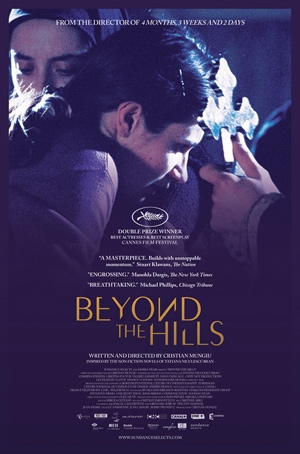Beyond the Hills

Cristian Mungiu certainly has an eye for uncompromising and bleak tales. His 2007 feature 4 Months, 3 Weeks and 2 Days candidly dealt with the subject of abortion with sparse and unflinching realism, winning acclaim from fans and critics alike. Beyond the Hills investigates the horrors of authority in religion and the irrational hysteria that surrounds it. The narrative follows two young women in an orthodox monastery in Romania, one of whom is later subject to an exorcism. What makes the film truly disturbing though is that it is not merely a work of fiction – it is rooted in reality and is based on events that happened in 2005.
When the troubled Alina (Cristina Flutur) returns to Romania from Germany to visit her childhood friend (and implied ex-lover) Voichita (Cosmina Stratan), she is shocked to discover that she has spent the past few years as a devout nun. Failing to fit in with her friend’s new existence at the monastery and prone to violent outbursts, Alina is seen as having “the evil”. As her fits of rage continue, Alina is cast out. When she is unable to go anywhere else, the priest and sisters get together and perform an exorcism with terrible consequences.
Every time the word “exorcism” is mentioned in a film, alarm bells start ringing. Naturally one is reminded of the dreadful The Last Exorcism ilk films that Hollywood churns out all too often. Beyond the Hills is a far cry from this type of artless and cheap cinema.
Mungiu’s cinematography is central to the visceral impact of the film: the camera often stays in a fixed frame for over five minutes at a time, and coupled with the lack of accompanying soundtrack, the result is stripped down and bare so that the audience feel as if they are observers of this world of largely clandestine practises. Considering the story that’s being told, it’s difficult to imagine how the technical devices utilised in the film could have been bettered. The two main actresses are also integral to the effect, especially Cristina Flutur, whose chilling and compelling performance led her to win the best actress prize at Cannes.
If there is any problem with the film it is mostly in the director’s decision to allow the narrative to work as a slow burner. Some will lose patience and others won’t be able to take the oppressive darkness of the work, but once involved, the intelligent viewer will heed the film’s message about the workings of institutions. And as the credits roll they will be left with plenty more to dwell upon.
Conor Nyhan
Watch the trailer for Beyond the Hills here:























Facebook
Twitter
Instagram
YouTube
RSS